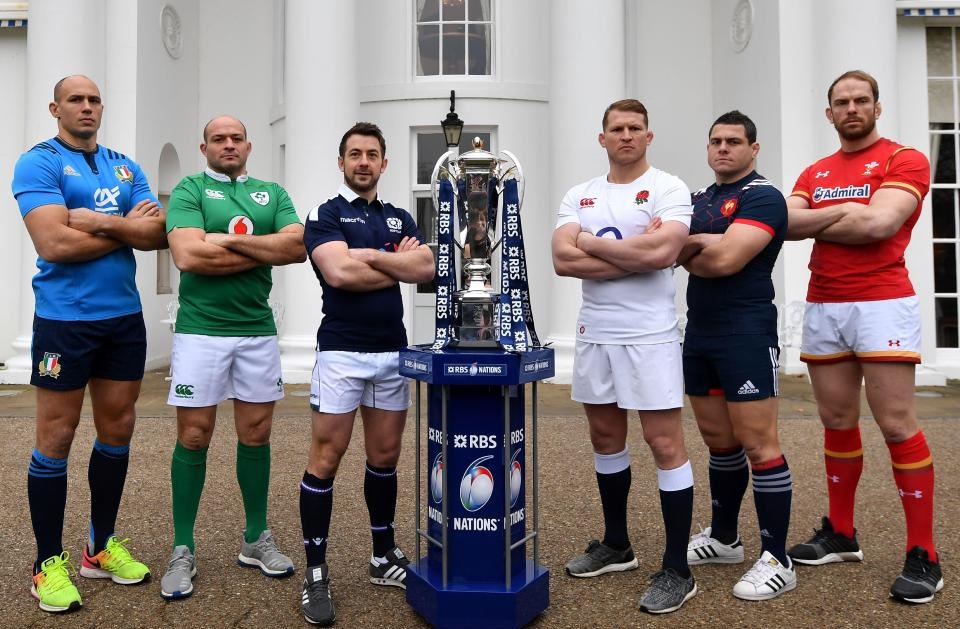The most anticipated Six Nations tournament in years kicked off at the hallowed fields of Murrayfield on Saturday. The visitors – the All Blacks-conquering Irish, keen to lay down a marker, tipped to be one of the favourites for the title along with England.
In the season ending autumn series of last year, Ireland went a long way to establish themselves as a rugby superpower. They were arguably a tad unfortunate not to have accomplished a rare ‘double’ over New Zealand, falling just shy in the second game played in Dublin. Scotland, fair to say, the least potent of all the home nations showed some progress. Sadly, it was heartbreak once again against Australia, losing by a point despite a gutsy display.
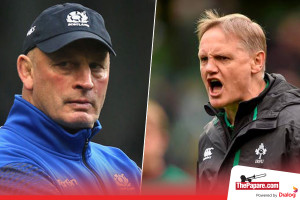
This year, the Irish / Scottish clash had a bit if spice to it. Yes, once again, it is Lionsyear, with this competition providing the ultimate audition. However, you had two teams, both coached by New Zealanders, close friends, who have worked closely together in the past. Joe Schmidt has been heaped with praise in recent times, and now boasted of a talented group of players with considerable depth in his squad. Vern Cotter on the other hand was planning his swansong, no doubt keen to go out on a high. There was belief once again in Scotland, largely attributed to the meteoric rise of the Glasgow Warriors as a real force in European club rugby. Unsurprisingly, the Warriors made up a bulk of the team that lined up in blue.
The game commenced at a frantic pace, and before you knew what, Stuart Hogg had crossed the chalk twice. Keith Earls scored by the corner flag off a well worked move for the Irish to bring them back in into the game. However, an outrageous lineout ploy saw Alex Dunbar virtually walk through a bamboozled Ireland defense, to restore some daylight between the scores. At half time, the Scots were sitting pretty 21-8.
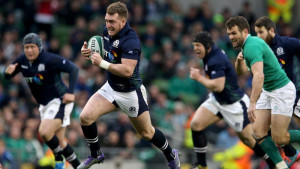
However, as predicted, Ireland opened the second half all guns blazing. They used their heavy forwards to bash the Scottish phase after phase. The blue wall finally gave way and Ian Henderson barged over from close range. Ireland had shaken off their slumber and were soon well and truly in the contest when Paddy Jackson, playing in place of the injured Johnny Sexton, ran a fine angle to slice through and score. Ireland finally had their noses in front, with a quarter left to play. At this point, the hosts seemed destined for another late disappointment, with a heavy tackle count beginning to tell as they visibly seemed to be running out of steam. But they dug deep and conjured up courage and grit to plod on, and managed to find themselves at the right side of the field. Two late penalties followed, the last in the final play of the game. Scotland had turned the competition on its head.
For the hosts, Jonny Gray was outstanding – in defense and with ball in hand. John Barclay came on in the second half and made an immediate impact. The only area of real concern was their scrummaging earlier on. But they got better as the game went along. With Finn Russell running the play and Stuart Hogg joining the attacking line, this Scottish team can hurt anybody. They will move on to Paris next week with confidence sky high. As for the Irish, they will rue that bad start. In international rugby, you cannot give yourself a mountain to climb. More often than not, you will fall short. This Ireland team is still one of the best around. If they kept Scotland at bay, and took their chances, they would have been home and hosed. With hopes of a ‘Triple Crown’ dashed, they will look to get back on the horse when they travel to Rome next week.
The second game saw France visit Twickenham to take on an England team on a 14-game unbeaten spree. The game in terms of tries being scored, was not exactly a thing of beauty. But it had all the makings of what a real Test match should be. France look a different side to that of the confused and lethargic efforts of recent times. They fielded arguably the biggest French team I have seen take the field. But they were not afraid to move the ball out wide. I thought that France had the better of the exchanges in the first half. Scott Spedding and Louis Picamoles were immense, punching holes in the English defensive lines at will. Despite going a man down, with Johnny May’s sin-binning, England were rather fortuitous to still go into lemons deadlocked at 9 apiece.
The war of attrition continued in the second half. French Coach Guy Noves swapped his props early, and France looked to be slowly gaining control in the set pieces. After an Elliot Daly long range effort on goal sailed through, France launched an onslaught on the English line. After a patient build up, a swift interchange of offloads, prop Rabah Slimani was on hand to go over. France now in the driving seat with a handy four-point lead with the clock ticking by. England were still stuttering, and struggling to get any fluency that came to them so naturally last year. Then, an Eddie Jones special finally turned the tide.Hartley was off, with the more match-hardened Jamie George taking his place. James Haskell and Ben Te’o were introduced to add muscle and brute force, which the French defense struggled to keep at bay.
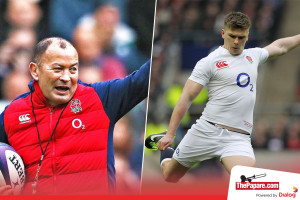
England looked rejuvenated and the mercurial Owen Farrell, now playing at first receiver put Te’o in space and the Worcester man didn’t need a second invitation. That proved to be a hammer blow for Les Bleus. They had one last opportunity, but replacement Doussain failed to find touch off a late penalty awarded in their own half, and the French were condemned to their sixth straight defeat in this fixture away from home.
The English performance was arguably the worst seen in the Eddie Jones era thus far. You wouldn’t expect them to hit the highs of recent times, with a squad ravaged by injury absences. Robshaw, the Vunipola brothers, Kruis, Watson, and the list continues. But to find a way to win when things do not bounce your way is a hallmark of a special team. A win is a win, and Jones will take it. I’m certain they will be much more cohesive for Wales next week.
For the French, it was an opportunity missed. But what is heartening to see is that they have got some very good young blood coming through. Gael Fickou, and young scrum half Serin were exceptional. The more this French team plays together, the better they will become. Be certain that they will still have a big say on how this tournament pans out.
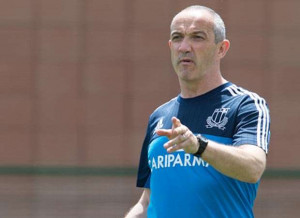
The final game of the week took place in Rome, with the Connor O’shea inspired Italy playing Wales. It was a bit frustrating to watch sometimes. Italy started well, and were the first to cross the line, giving their supporters reason to be optimistic of an upset. However, as has been the case over the years, the Italians discipline cost them again, giving away needless penalties. In the last quarter, the game really opened up, largely due to Wales having one eye on the newly introduced bonus point (for 4 tries).
In the end Wales ran out 33/7 winners, with a Liam Williams knock-on over the line denying them of being the first ever Six Nations awardees of the said point.
That copped off a very eventful first weekend of the tournament. To think that both hot favourites, England, and Ireland were to lose at the first time of asking would have seemed unthinkable in the lead-up. That very very nearly happened. So the teams will no doubt re-group, re-think, and re-adjust. There will likely be more fluency next week, at the end of which things would really start taking shape. My money is still on Ireland.

